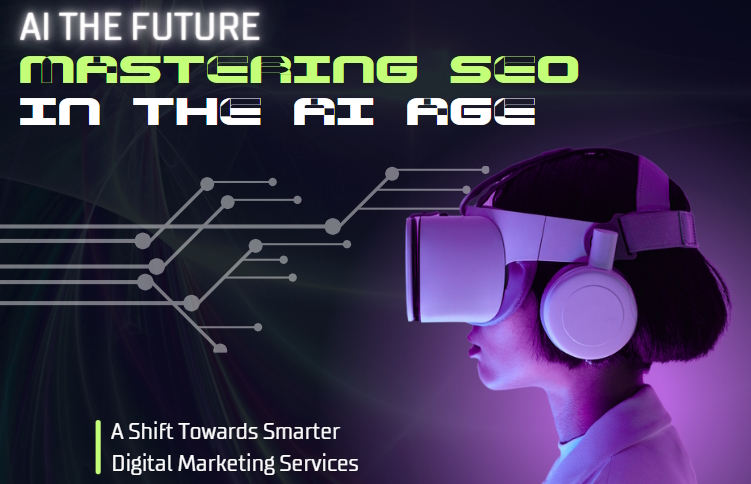Mastering SEO in the AI Age | A Shift Towards Smarter Digital Marketing Services

There's no denying it. Artificial intelligence is extending its tentacles into every nook and cranny of our lives, transforming the way we do things. In fact, every year, AI continues to stretch its influence into various aspects of our daily routines, bringing innovative solutions to the table that are transforming many sectors. One area that has particularly felt the seismic shift brought about by AI is Search Engine optimisation (SEO).
Today, as we stand on the threshold of a new era, where AI-driven search engines demand more advanced SEO services, traditional SEO tactics are compelled to evolve in order to stay in pace with the advancements in AI. With search algorithms growing increasingly sophisticated each day, our team at SEO Perth surpasses the ordinary and embraces the challenge of mastering SEO in the AI age.
The AI Influence: Shaping the Future of SEO Services
We are fast hurtling into an age where AI's ever-expanding role in SEO is creating ripples of change, paving the way for game-changing advancements. This rapid expansion and integration of AI in SEO are akin to a digital revolution. The stage is set for a thrilling journey, and according to a comprehensive 2023 report by Market Research Future, the SEO industry is more than ready to hop on for the ride. The study predicts a Compound Annual Growth Rate (CAGR) of 18.4% in the use of AI within the SEO industry from 2022 to 2027. But what does that imply for us marketers? Let's unpack what this means in everyday terms.
The Evolution of SEO: AI's Prominent Role
To put things into perspective, see a cityscape transforming rapidly with new constructions emerging at every corner. That's the dynamic SEO landscape we find ourselves in - constantly evolving, buzzing with innovation. However, it's not merely about numbers and statistics. It signifies a profound transformation that ripples through the entire industry, revolutionising our approach to SEO here at SEO Perth.
The future is a world where businesses of all shapes and sizes can effectively navigate the digital terrain without grappling in the dark. Imagine having a precision tool, powered by AI, that illuminates the path towards insights into user behaviour. This aids in tailoring content and strategies to meet actual user needs and acts as a guiding light in optimising online platforms.
The forecasted growth rate isn't just a statistic; it's an indication of the pace at which businesses are riding the digital wave. It demonstrates that businesses are not just merely aware of AI's impact on SEO but are actively integrating it into their strategies.
However, it's also important to remember that while the data can illuminate the path we're on, it also casts shadows. The increasing dependence on AI in SEO raises valid concerns about data privacy, digital ethics, and the possible widening of the resource gap between large and small businesses.
So, as we stand on the verge of this exciting digital frontier, we must remember to bring along our humanity. It's our responsibility to unveil the power of AI in SEO not just for profits or dominance but for better, more meaningful connections in this vast digital universe we're a part of. Because in the end, the future of AI in SEO services is not just about smarter technology; it's about the smarter use of technology to serve us all.
AI and SEO: A Paradigm Shift in Keyword Strategy
Remember the early days of SEO when 'keyword stuffing' was the norm? Well, those days are long gone. AI has reshaped this practice, bringing the focus on context, user intent, and the semantics behind search queries. Google's RankBrain has been pivotal in driving this shift, making keyword strategy more about the context and quality of content rather than the number of keywords used.
The AI Effectiveness on Keyword Research
Traditional keyword research often involved finding relevant keywords with a high search volume and strategically using them in content. However, AI-based tools like SEMrush's Keyword Magic Tool have taken keyword research to the next level. These tools provide long-tail keywords, potential keyword variations, and insights into the intent behind specific search terms. With such powerful tools at their disposal, businesses can align their content strategy to meet user expectations, leading to better engagement and conversions.
AI’s Growing Influence in Content Optimisation and Link Building
The beauty of AI is that its influence doesn't stop at keyword research. AI is a robust tool when it comes to content optimisation and link building. Platforms like Frase.io and MarketMuse, and even our team of marketers at SEO Perth use AI to analyse top-performing content in specific niches, offering valuable recommendations that content creators can use to improve their own work.
The Impact of AI on Content Optimisation: Introducing BERT
BERT, Google's AI technology, has transformed how content is optimised for SEO. BERT understands the context of words in search queries, which allows it to match search queries with more relevant search results. This development emphasises the importance of high-quality, relevant, and easy-to-read content.
Revolutionising Link Building with AI
In the realm of link building, AI has made significant strides through Google's Penguin algorithm. Today, instead of collecting as many links as possible, SEO professionals focus on earning high-quality, natural backlinks from reputable websites. This shift emphasises the importance of meaningful collaborations, high-quality content creation, and genuine engagement.
Embracing AI SEO Tools: A Step Towards a Brighter Digital Future
With the rising popularity of AI-powered SEO tools like Market Brew, SEO professionals can simulate search engine crawls and conduct a granular analysis of their site's SEO health. According to a 2023 SEMrush survey, a whopping 73% of SEO professionals are now using AI-powered tools in their strategies. But rest assured, these tools are not meant to replace SEO professionals. They're here to take over the tedious, data-oriented tasks, freeing up SEO professionals to focus more on the creative aspects of SEO.














